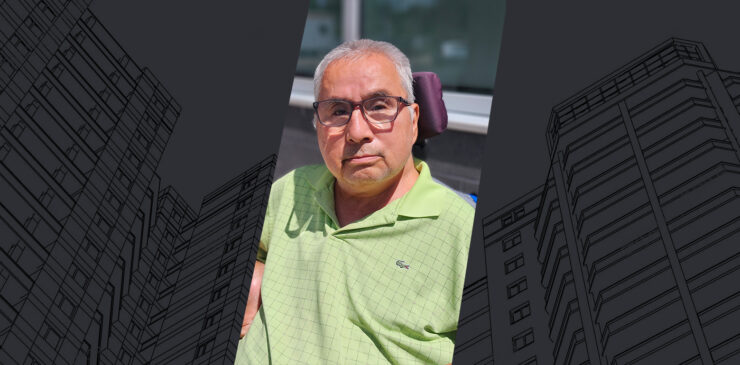Matthew was raised in the Peterborough area and worked hard in a lumber yard while attending Trent University for Indigenous Studies. After battling addictions and alcohol, Matthew sought shelter services in and around Toronto, Oshawa, and Peterborough. In 2013, he experienced a slip that resulted in a spinal cord injury. Although this injury was life-changing, Matthew believes it was a blessing, as it helped him become sober, more social, and closer to his family again.
By 2015, Matthew was struggling to find accessible housing. The lack of availability led to years-long waitlists. With no options available, he had to choose long-term care as a solution to his housing needs. At the time, he was in his early fifties, making him significantly younger than the other residents.
 However, long-term care came with its own set of challenges. Matthew found himself being sent to the hospital over 20 times a year for various issues, including urinary tract infections and pressure injuries. Sometimes, the pressure injuries were severe enough to affect his bones. Additionally, there were problems related to incorrect positioning in his wheelchair and the failure to properly connect his mobility equipment. These issues directly impacted his independence. The staff at the long-term care facility were often inexperienced with spinal cord injuries. Matthew believes there should be more staff trained in disability-related care, and that personal support workers ought to receive specific training tailored to various disabilities.
However, long-term care came with its own set of challenges. Matthew found himself being sent to the hospital over 20 times a year for various issues, including urinary tract infections and pressure injuries. Sometimes, the pressure injuries were severe enough to affect his bones. Additionally, there were problems related to incorrect positioning in his wheelchair and the failure to properly connect his mobility equipment. These issues directly impacted his independence. The staff at the long-term care facility were often inexperienced with spinal cord injuries. Matthew believes there should be more staff trained in disability-related care, and that personal support workers ought to receive specific training tailored to various disabilities.
Cultural barriers also existed, particularly regarding his ability to participate in Indigenous practices such as smudging. Smudging is traditionally a ceremony for purifying or cleansing the soul of negative thoughts of a person or place. The practice involves burning herbs and is believed to cleanse the body, mind and spirit, promoting balance and harmony.
 He’s accepted well by his roommates, but his biggest barrier has been dealing with the inexperience of the system. He’s losing faith in it. He’s been in this situation for months.
He’s accepted well by his roommates, but his biggest barrier has been dealing with the inexperience of the system. He’s losing faith in it. He’s been in this situation for months.
– Matthew’s sister
Despite these challenges, this facility had been Matthew’s home for a decade. However, during a recent hospital stay, the ministry shut down his facility for not meeting basic care standards, which meant no new admissions. This also affected Matthew; despite being a readmission, he was not allowed back, even though all his clothes and belongings remained there. It has been reported that it could take up to two years before new admissions are accepted. Matt is worried he might be sent to a different facility.
Matthew’s family has been a significant source of support, but they have their concerns. His sister expressed, “His resilience has gotten him through everything. He’s accepted well by his roommates, but his biggest barrier has been dealing with the inexperience of the system. He’s losing faith in it. He’s been in this situation for months. Who knows how much longer this will last? He’s not advocating for himself like he used to, and I don’t like what I’m seeing.”
Across the province, there is an increasing number of young people with spinal cord injuries turning to long-term care homes due to a lack of available housing and support. Long-term care is not the solution for those with disabilities who can lead an independent life with the right supports. There are not enough trained staff who understand specific disabilities, including spinal cord injuries, and resources are limited. The solution lies in increasing the stock of available, accessible housing, providing options for individuals with spinal cord injuries and other disabilities.






